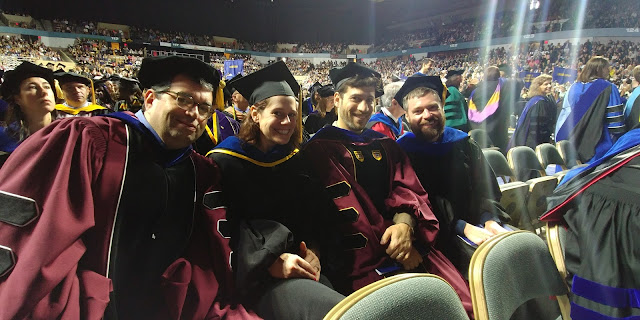 |
| B.S. in Urban Studies, class of 2016 |
This was to be the week of the biggest and most important of a university's annual events, the graduate commencement in undergraduate graduation. But as it has in so many parts of our lives, the Covid-19 virus had other plans. Those events were cancelled and have been rescheduled for late summer. Hopefully they will occur in August. However, that leaves us in mid-May and it is important to the department faculty that we recognize our graduates publicly in the normal calendar of events, and welcome them to the ranks of our truly remarkable alums.
It is our great honor as the Urban Studies faculty to share with you the names of those who have graduated with degrees earned in the department of Urban Studies for the academic year 2019-20. Congratulations to all on a job well done.
 |
| Dr. Shiko Gathuo with recent M.S. in NPM degree recipients Joanna Anderson and Beth Jarret. |
2020 M.S. NON-PROFIT MANAGEMENT
Adusu, Issac
Levy, Tracy
Smyth, Adrienne
Levy, Tracy
Smyth, Adrienne
 |
| Dr. Thomas Conroy, Dr. Madeline Campbell, Dr. Adam Saltsman, and Dr. Timothy Murphy |
2019-2020 B.S. URBAN STUDIES
Amoah, Denzel
Brunelle, Michael
Fitzmaurice, Steven
Gbale, Bianca
Guerin-Lampila, Christine
Guerrero, Mars
Karanja, Mercy
Le, Quoc
Moraes, Jonathan
Mustafa, Syed
Riedle, Cody
Sciannameo, Lisa
Stevenson, Kasmir
Toombs Jr, William
Amoah, Denzel
Brunelle, Michael
Fitzmaurice, Steven
Gbale, Bianca
Guerin-Lampila, Christine
Guerrero, Mars
Karanja, Mercy
Le, Quoc
Moraes, Jonathan
Mustafa, Syed
Riedle, Cody
Sciannameo, Lisa
Stevenson, Kasmir
Toombs Jr, William
Comments
Post a Comment